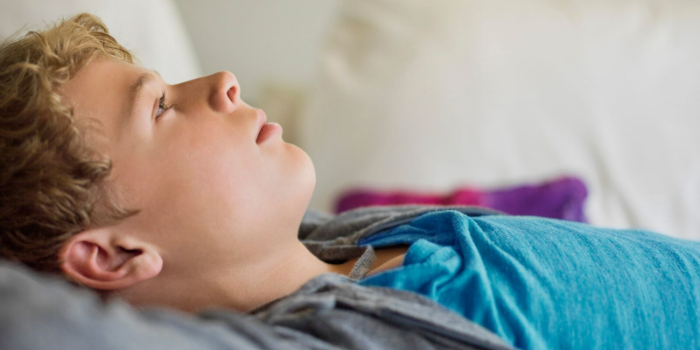Spotting the signs of anxiety in teenagers and how to manage it
Are you worried that a teenager in your life might have anxiety? Anxiety is common, and is a normal emotion to feel at times. But if a young person you know appears to be worrying or is agitated a lot, this could be a sign that they need some support with anxiety. Here, I look at some common symptoms of anxiety, and provide advice on how you can help and support your loved one.

How common is anxiety in teenagers?
Anxiety is common in teenagers. Young people often experience lots of change in their lives in a short period of time. And, this can increase the risk of anxious feelings and anxiety. Factors that can increase the risk of anxiety in teenagers include:
- pressure from schoolwork and exams
- being bullied
- divorce or separation of parents
- problems within friendship groups
- changes such as moving house or school
- financial or housing problems
- having a parent with anxiety
It’s estimated that 1 in 12 teenagers experience anxiety. So, if you think your loved one might be affected by anxiety, you’re not alone.
What are the signs of anxiety in teenagers?
Anxiety can cause lots of signs and symptoms. And, some of them might not be obvious to friends and family. If you’re concerned your teenager may be experiencing anxiety, you could try asking them if they often:
- feel nervous or panicked
- feel overwhelmed
- have trouble sleeping
- avoid spending time with friends and family
- have little appetite
- feel wobbly or faint
- feel tearful
- have a fast heart rate
Regularly experiencing these symptoms could be a sign that they have anxiety. And, they might benefit from getting some support.
Do teenagers get burnout?
‘Burnout’ is used to describe a range of symptoms such as feeling exhausted, overwhelmed, and having low motivation.
It’s often used to describe the effects adults experience after being under long-term stress in the workplace. We don’t yet know whether teenagers experience burnout symptoms as a result of pressures in their lives from school or exams, for example. But, we do know that burnout can cause similar symptoms to those caused by anxiety.
How can I help my teenager with anxiety?
Research has shown that adolescents are less likely to ask for support themselves. Often, they need or prefer adults in their life to arrange help for them. The good news is that there are lots of things that can help teenagers with anxiety. These can include the following.
- Seeking support from school. Many schools provide mental health training for teachers and may also offer school-based counselling.
- Go online. Mental health charities like Young Minds specialise in providing mental health support for young people. Their website has lots of resources and advice for your loved one to access and read if they’d like to.
- Consider counselling. Counselling sessions with a trained mental health professional can provide young people with a safe space to share how they’re feeling. Your GP can provide further information on available local counselling services.
- Local support groups. These are confidential meetings providing an opportunity to meet other people with anxiety. And, it can be a way to share experiences and coping strategies. Your GP can provide details of local support groups that your teenager can attend, if they’d like to.
- CBT. Talking therapies such as cognitive behavioural therapy (CBT) can help your teenager manage their anxiety. CBT focuses on how our thoughts can impact our feelings and behaviour and works to try and change these patterns of thinking.
- Applied relaxation therapy. This is another form of talking therapy, that works by helping you learn to relax your muscles at times when you usually experience anxiety.
- Medication. Your GP may refer your loved one to a specialist who can assess whether medication is a suitable option.
What are some coping skills for anxiety?
There are many coping skills and self-help tips that can help to manage anxiety in a healthier way. You could try talking about them with your teenager to see if they might help. These include:
- talking to someone they trust about how they’re feeling when they’re anxious
- using techniques to manage worries, such as a worry tree or worry jar
- practicing mindfulness
- trying breathing exercises to feel calmer
Making lifestyle changes like trying to get enough sleep, exercising, and eating a healthy balanced diet can also help to improve symptoms of anxiety.
Speak to your GP if you’re worried about your teenager’s mental health, or would like further advice or support.
If you need help now
This page is designed to provide general health information. If you need help now, please use the following services.
- Samaritans. 116 123 (UK and ROI) - This helpline is free for you to call and talk to someone.
- NHS Services has a list of where to get urgent help for mental health.
- Mind website. Click the ‘Get help now’ button on the page. This is a tool that is designed to help you understand what’s happening to you and how you can help yourself.
If you think you might harm yourself or are worried someone else might come to immediate harm, call the emergency services on 999 or go to your local accident and emergency department.
Our health insurance allows you to skip a GP referral in some cases, and speak to a mental health practitioner. Learn more today.
-
Sources Sources
- What is anxiety? Symptoms of anxiety & getting help. YoungMinds. Youngminds.org.uk. Accessed March 2023
- What makes young people anxious? YoungMinds. Youngminds.org.uk. Accessed March 2023
- How to help children deal with divorce or separation. NSPCC. Nspcc.org.uk. Accessed March 2023
- Aktar, E., & Bögels, S.M. (2017). Exposure to parents’ negative emotions as a developmental pathway to the family aggregation of depression and anxiety in the first year of life. Clinical Child and Family Psychology Review, 20(4), 369–390. https://doi.org/10.1007/s10567-017-0240-7
- Why don’t teenagers seek help for anxiety and depression? National Institute for Health and Care Research (NIHR). Nihr.ac.uk. Published 29th September 2021
- Parenting teenagers: recognising and responding to anxiety. Barnardo’s. families.barnardos.org.uk. Accessed March 2023
- Depression, anxiety and mental health. NSPCC. Nspcc.org.uk. Accessed March 2023
- Burnout. Mental Health UK. Mentalhealth-uk.org. Accessed March 2023
- Anxiety and panic attacks. What are the symptoms of anxiety? Mind. Mind.org.uk. Published February 2021
- Mental health services for schools in England. Mentally healthy schools. Anna Freud National Centre for Children and Families. Mentallyhealthyschools.org.uk
- Young Minds. Youngminds.org.uk. Accessed March 2023
- Counselling and Therapy. How to access therapy. Young Minds. Accessed March 2023
- Anxiety UK courses and groups. Anxiety UK. Anxietyuk.org.uk. Accessed March 2023
- Anxiety and panic attacks. What treatments are available? Mind. Mind.org.uk. Published February 2021
- Anxiety and panic attacks. Self help resources. Mind. Mind.org.uk. Published February 2021
- Guide to CAMHS. Young Minds. Youngminds.org.uk. Accessed March 2023
- Four coping techniques for when you feel anxious. YoungMinds. Youngminds.org.uk. Accessed March 2023
About our health information
At Bupa we produce a wealth of free health information for you and your family. This is because we believe that trustworthy information is essential in helping you make better decisions about your health and wellbeing.
Our information has been awarded the PIF TICK for trustworthy health information. It also follows the principles of the The Information Standard.

More mental health and wellbeing articles
Did you find our advice helpful?
We’d love to hear what you think. Our short survey takes just a few minutes to complete and helps us to keep improving our healthy lifestyle articles.
Legal disclaimer
This information was published by Bupa's Health Content Team and is based on reputable sources of medical evidence. It has been reviewed by appropriate medical or clinical professionals and deemed accurate on the date of review. Photos are only for illustrative purposes and do not reflect every presentation of a condition.
Any information about a treatment or procedure is generic, and does not necessarily describe that treatment or procedure as delivered by Bupa or its associated providers.
The information contained on this page and in any third party websites referred to on this page is not intended nor implied to be a substitute for professional medical advice nor is it intended to be for medical diagnosis or treatment. Third party websites are not owned or controlled by Bupa and any individual may be able to access and post messages on them. Bupa is not responsible for the content or availability of these third party websites. We do not accept advertising on this page.







